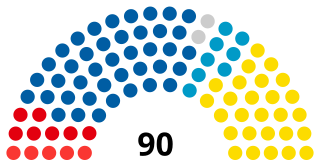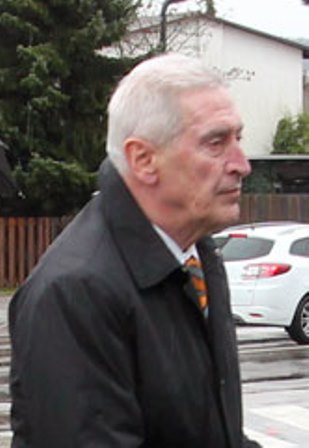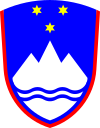
Slovenia, officially the Republic of Slovenia, is a country in southern Central Europe. It is bordered by Italy to the west, Austria to the north, Hungary to the northeast, Croatia to the south and southeast, and a short coastline within the Adriatic Sea to the southwest. Slovenia is mostly mountainous and forested, covers 20,271 square kilometres (7,827 sq mi), and has a population of 2.1 million. Slovenes constitute over 80% of the country's population. Slovene, a South Slavic language, is the official language. Slovenia has a predominantly temperate continental climate, with the exception of the Slovene Littoral and the Julian Alps. A sub-mediterranean climate reaches to the northern extensions of the Dinaric Alps that traverse the country in a northwest–southeast direction. The Julian Alps in the northwest have an alpine climate. Toward the northeastern Pannonian Basin, a continental climate is more pronounced. Ljubljana, the capital and largest city of Slovenia, is geographically situated near the centre of the country.
The politics of Slovenia takes place in a framework of a parliamentary representative democratic republic, whereby the Prime Minister of Slovenia is the head of government, and of a multi-party system. Executive power is exercised by the Government of Slovenia. Legislative power is vested in the National Assembly and in minor part in the National Council. The judiciary of Slovenia is independent of the executive and the legislature. Slovenia is a Member State of the European Union and is represented in the Council of the EU and through elections to the European Parliament.

Ljubljana is the capital and largest city of Slovenia, located along a trade route between the northern Adriatic Sea and the Danube region, north of the country's largest marsh, inhabited since prehistoric times. It is the country's cultural, educational, economic, political and administrative center.

The National Assembly is the general representative body of Slovenia. According to the Constitution of Slovenia and the Constitutional Court of Slovenia, it is the major part of the distinctively incompletely bicameral Slovenian Parliament, the legislative branch of the Republic of Slovenia. It has 90 members, elected for a four-year term. 88 members are elected using the party-list proportional representation system and the remaining two, using the Borda count, by the Hungarian and Italian-speaking ethnic minorities, who have an absolute veto in matters concerning their ethnic groups.

Ljudmila Novak is a Slovenian politician and a Member of the European Parliament. She is the president of the New Slovenia – Christian People's Party. Since 21 December 2011, she has been the vice-president of the Slovenian National Assembly.

The most recent enlargement of the European Union saw Croatia become the European Union's 28th member state on 1 July 2013. The country applied for EU membership in 2003, and the European Commission recommended making it an official candidate in early 2004. Candidate country status was granted to Croatia by the European Council in mid-2004. The entry negotiations, while originally set for March 2005, began in October that year together with the screening process.

The National Council is according to the Constitution of Slovenia the representative of social, economic, professional and local interest groups in Slovenia and has a legislative function working as a corrective mechanism of the National Assembly, although it does not itself pass acts. It may be regarded as the upper house, but the bicameralism is distinctively incomplete. It is not elected directly by the population, but meant to represent different interest groups in the country. The councillors are elected for a five-year term.

The Slovenian Parliament is the informal designation of the general representative body of the Slovenian nation and the legislative body of the Republic of Slovenia.

Zoran Janković is a Slovenian businessman and politician serving as Mayor of Ljubljana since April 2012. He previously served as mayor from 2006 to 2011.

The Slovenian national cricket team is the team that represents Slovenia in international cricket. The national organising body in Slovenia, the Slovenian Cricket Association, became an affiliate member of the International Cricket Council (ICC) in 2005 and an associate member in 2017.

Lesbian, gay, bisexual, and transgender (LGBT) rights in Slovenia have significantly evolved over time, and are considered among the most advanced in Eastern Europe. Slovenia was the first post-communist country to have legalised same-sex marriage, and anti-discrimination laws regarding sexual orientation and gender identity have existed nationwide since 2016.

The Estonian national cricket team is the team that represents Estonia in international cricket. They were granted affiliate status in June 2008 by the International Cricket Council (ICC).

The following outline is provided as an overview of and topical guide to Slovenia:

The National Assembly Building, officially the Assembly of the Republic of Slovenia, also colloquially the Parliament in Ljubljana, the capital of Slovenia, is a modernist palace housing the legislature of Slovenia. Built between 1954 and 1959 upon plans by the architect Vinko Glanz, it is a three-story building with an area of 2,200 m2 (24,000 sq ft). It is located at Republic Square in the center of Ljubljana. Annual visitor numbers are around 13,000.

Milan Pogačnik is a Slovenian politician. Between November 2008 and March 2010, he served as the Minister of Agriculture, Forestry and Nutrition of Slovenia.

Elections were held on municipal, provincial, republican and federal levels in Yugoslavia from its foundation in 1918 throughout its breakup in 1992.

The Treaty of Accession 2011 is an agreement between the member states of the European Union and Croatia concerning Croatia's accession to the EU. It was signed on 9 December 2011 in Brussels by the heads of state or government of the 27 member states and by the president of Croatia, Ivo Josipović, and Prime Minister Jadranka Kosor.

Aleš Čerin is a Slovenian businessman and a politician. In 1973, he graduated from law at the University of Ljubljana. He was the Secretary-General of the Government of the Republic of Slovenia since 1986 till 1992, during the Slovenian proclamation of independence in 1991. Since 1992, he worked in the retail company Mercator, and was since 1997 till 2005 member of its executive board. He was elected to the city council of the City Municipality of Ljubljana in October 2006 as a member of the Zoran Janković List and was named by Janković a deputy mayor of the municipality.

Alojz Kovšca is a politician from Slovenia who served as President of the National Council of Slovenia from December 2017 to December 2022.






















